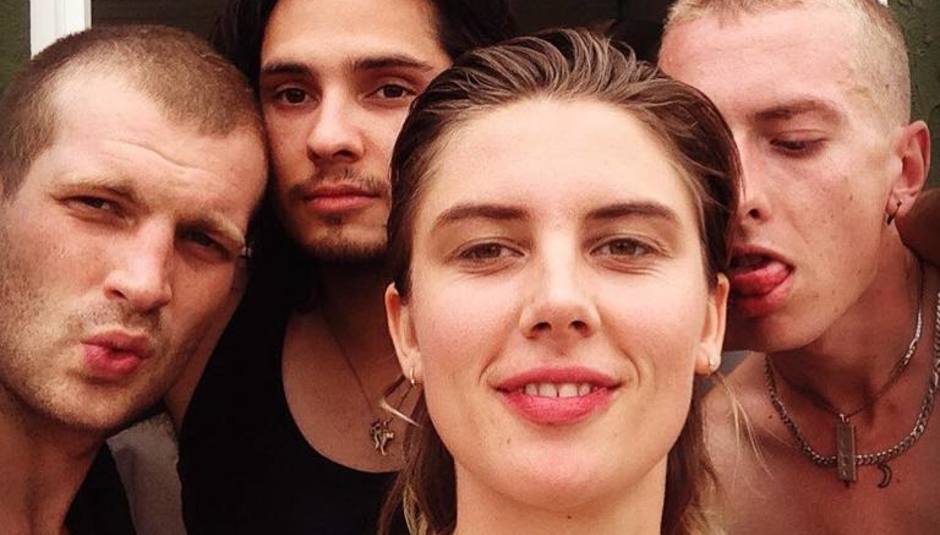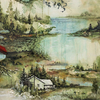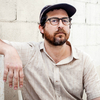Wolf Alice made DiS' favourite album of 2017 with the incredible Visions Of A Life. It's been an incredible journey having spent the best part of five years touring the globe while somehow still finding the time to write two of the decade's most invigorating long players along the way. If 2015's debut My Love Is Cool set the scene, this year's follow-up firmly established its creators as one of the finest guitar bands of their generation.
We caught up with Ellie Rowsell and Joff Oddie from the band during their sold-out tour of the UK to talk about what's arguably been their most satisfying and ultimately successful year to date.
DiS: How's the tour been so far? What kind of reception have the new songs been getting?
Joff Oddie: Great! It's been really nice to play some bigger sized venues again. We did a really underplayed tour of the US followed by some intimate shows in the UK a few months ago, so it's nice to get back into big rooms once more.
Your live show does involve a lot of interaction with the crowd, but as the band's popularity grows along with the size of the venues you play, does that aspect of your performance have to be refined to accommodate such bigger spaces?
Ellie Roswell: No, not really. I think we give more thought to production. Stuff like how can you fill the stage. We have a light show now but aside from that nothing's really changed. It's more fun in a way because there's more of a budget to play with now.
You have Sunflower Bean and Superfood opening for you on this tour. Are you big fans of their music?
JO: We are. We've toured with both bands before so it was quite an easy decision.
ER: When we first toured together none of us had released an album at that point.
JO: We toured with Sunflower Bean on one of our first tours in the States.
Now you have two albums worth of material is it difficult deciding what to include and what to leave out of the live set?
ER: We try and keep the sets high octane and energetic. We like to keep it dynamic so we can have those more mellow moments as well. We actually have more mellow songs than people probably realise. It's a lot more fun devising the setlists now we have two albums out. We have a lot more material to scope from now rather than just scraping the barrel for old b-sides that aren't really representative of where we are as a band now.
JO: We used to play a lot of EP tracks which we haven't played for a while.
Many of your songs are very diverse in sound and structure, particularly on Visions Of A Life. Are there any which you find difficult to replicate live?
ER: Yeah, we have a few although I think we're becoming a lot better at it. Just by putting more thought into it and using keyboards and samples where necessary. 'Silk' was one we struggled with for a long time. We weren't sure how to play it live so it was rarely in the set before it got used on Trainspotting 2. After that, we realised it had to be in the set permanently because it was one of the songs most people knew. So we had to try and play it live in a way that made it sound more like it did on the record. At first, it sounded quite different. With this album, I think we've done quite well making it sound like it does on the record. I think...
JO: I've never seen a Wolf Alice show from the audience!
When did the songs that made Visions Of A Life first start to take shape?
JO: Probably within the first six months after we recorded the first album.
ER: We just collated ideas whilst we were on the road then fleshed them out once we had a bit of time. We didn't really force any of the writing on this record so when we did sit down to write a lot of the ideas were already stored up. A lot of the songs had already taken shape so we didn't have to go out and look for ideas or inspiration. It was a very natural process.
You'd already started playing 'Yuk Foo' towards the back end of the US leg of the tour for My Love Is Cool. Was that the first song to be finished off the second album?
ER: It was. Mainly because it's quite short and easy - maybe easy is the wrong word? - simplistic in its chord structure and words. It didn't really end up that way but at the time we thought it was going to be a really live song. The version that made it onto the album actually became quite layered in the end.
JO: It was always a bit of a shame because we get so much from playing songs to audiences but then a couple of recordings appeared on the internet and articles were written online about it to the point where we knew we couldn't do it like this anymore.
ER: We were basically just road testing it and then someone put the song online which was really annoying.
JO: So the writing for this album became quite blind compared to the first album where we found out if a song worked by playing it live.
How long did the writing and recording process take from start to finish?
ER: We were doing it all the time but I think we refined and polished the songs for a good six months before we went into the studio.
JO: A good 70% of those ideas for songs had been written before that. It was more like a filtration process really.
Were there any songs or ideas that didn't make it onto the album which you might revisit in the future?
ER: Yeah, there were a few. We have so many songs that don't have recordings. Some have multiple demos. We're always writing so I guess from that aspect we wouldn't really want to go back to old songs when we're making a new album. But then at the same time, we'd like people to hear some of these songs so maybe they'll come out on a mixtape or exclusive release format at some point. Angel Olsen's just released a new album (Phases) that's a collection of demos and b-sides which perhaps weren't what she wanted the next album to sound like and that might be something we'll look into doing in the future. It would be a shame for all those songs to be unheard.
Justin Meldal-Johnsen produced Visions Of A Life. How did he become involved and what did he bring to the overall sound of the record?
JO: He's the ultimate facilitator. He's got this really unique production style that isn't a particular sound. His sound is getting the best of the people he works with. It sounds really cliched but it's true. If you listen to the records he's worked on they're all really diverse. But his skills set is so high he can cater himself to different environments. That's exactly what we needed. One song needing to sound quite nasty whereas another would need to sound angelic. He had all the skills to be able to do that.
Were there any radical changes to the record after Justin became involved?
ER: No.
JO: Sonically from an engineering point of view it did but nothing drastic as far as the writing was concerned.
ER: Justin didn't want to make decisions for us; he really wanted us to do our own thing. He was just going to help rather than tell us what we needed to do. It's not supposed to be perfect if it isn't ready. He wasn't there to write the songs for us, he was there to bring the best out of what we had. And he was like a fifth member of the band rather than a dictator.
JO: We also had some really great engineers on the record as well. Carlos de la Garza and Mike Schuppan.
A lot of bands would have taken the easy route and written a bunch of three-minute radio friendly unit shifters for their second record. Did you consciously set out to make Visions Of A Life as diverse and eclectic as possible?
JO: We tried to write an album full of radio-friendly songs!
'Don't Delete The Kisses' is probably my favourite song on the album, if not of everything you've done so far. It reminds me of 'Hobart Paving' by Saint Etienne in many ways. What inspired the monologue verses?
ER: Just having a lot to say I suppose. That song is a story, a stream of consciousness that doesn't really lend itself to a traditional song structure. Sometimes if you add melody to what you want to say you end up having to cut things down and make sure they fit. Or I guess you don't have to do anything. There are no rules. But I try and make sure it rhymes and fits the melody. When it's coming from a real place you don't want to compromise what you have to say and with 'Don't Delete The Kisses' it worked.
Visions Of A Life has received an endless stream of critical acclaim since it was released. Did you expect such a unanimously positive reception?
ER: We didn't, although we could feel the excitement building when we first shared the record with our close families and friends so I guess we thought some people might like it because that was such a powerful response. It wasn't without criticism. When you put something out like 'Yuk Foo' alongside something like 'Don't Delete The Kisses' you're not going to satisfy everyone. So we are very flattered by the reception. Very grateful people like it.
Congratulations on being Drowned In Sound's album of the year! Who would be your number one albums for 2017?
ER: I don't have any sense of time so I don't know when anything came out!
JO: I'm really rubbish at keeping up to date with new music. I tend to go back as a default rather than focusing on now.
ER: I think mine would actually be the Superfood album. I've played that the most. I can put it on when I'm out partying or drinking or out with my mates but I can also listen to it when I'm going to bed or to accompany me reading a book. It's just really versatile and fun. It's so hard to write fun music. When I watch them play it live I want to go and dance, and it's so musical. I think it's really tough and they've managed to conquer that.
JO: I have to say the Alt J record's been one of my favourites this year.
Ellie: Alex G can't seem to do anything wrong. Every album he's put out has been so good. Big Thief are a band from America I really like. I've really enjoyed partying to that J Hus album, and I like the Lorde album as well. Thinking about it there's been a lot of great records this year!
You played a set at the demo against the Conservative government in July. Do you think the Brexit and the result of this summer's election has mobilized musicians and bands to become a lot more politicized?
JO: That's completely what happened. The left is fabulous in many ways but one criticism is I think a lot of people can be lazy. It took Brexit, Trump becoming president, and a lot of ill decisions to make people stand together and actually do something. Stupid things have happened in the last couple of years and people have realised if you don't do something you only have yourself to blame.
On the flipside, there's often an upsurge in great, challenging art and music in times of recession and austerity.
ER: What I like about it is politics doesn't have to enter art for people's opinions to be heard. I've always felt... Not ashamed... It didn't come naturally to me to write music. Anything other than my personal feelings and introspective things. And yet I cared. I think with the ever-increasing use of social media and distrust of mainstream media it's given people a voice in art and politics that might not have had one previously.
Do you think social media has played a part in Wolf Alice's rise to fame?
ER: I think it has. Although I kind of see the internet as being good and bad when it comes to sharing music. It's like we were saying earlier about 'Yuk Foo' being downloaded onto YouTube then reviewed off the back of one phone recording. That's the bit I don't like.
You recently invited a fan to play guitar on stage with you in Glasgow. Who would you like to have shared a stage with?
JO: I'd like to have done a guitar solo with The Vines. That would have been fun.
What advice would you give new bands just starting out?
JO: Just work on the important stuff. It's easy to get carried away with stuff you don't have to worry about like marketing. In the beginning, you just need to work on the fundamentals; learn to write songs and play together. You can always work out the PR stuff later. Do the primary stuff properly first. In all areas of life, people make you believe you can't do stuff unless you have someone doing it for you. It's such a rubbish outlook. If you have an instrument you can make music.
ER: There's this train of thought especially with the Internet that bands need to get their music out there as soon as possible to as many people as possible but that can actually hinder you. Especially if you're not ready.
JO: Play as many shows as you can. There are open mics everywhere. More often than not another promoter will see you at an event like that and ask you to play their night. Things will gradually build from there.
ER: But be careful about where you're playing. There are still promoters that have these pay-to-play mindsets where you have to bring 30 people down before you get paid. Especially in London.
JO: That's not a promoter. That's a criminal.
You're touring for the rest of this year. What are your plans for 2018?
ER: It goes back to what we were saying about marketing being secondary to playing shows because we don't plan anything! Hopefully, we'll be playing a few festivals. Also, it was nice to write this record on the road but hopefully with the next one, we'll be able to take a chunk of time out and write it at home.
Would you take a different approach to writing that way, especially having written on the road for so long?
ER: I guess we would, but that's what makes it so exciting. A new way of doing things that we haven't tried yet. We've never gone away and thought about what direction we want to go in or anything like that. That might be the way we work best? We don't know that yet.
Visions Of A Life is out now via Dirty Hit. Read the 10/10 DiS review here. For more information about the band, including forthcoming tour dates, please visit their official website.






















